The Gene Raymond connection, part 2
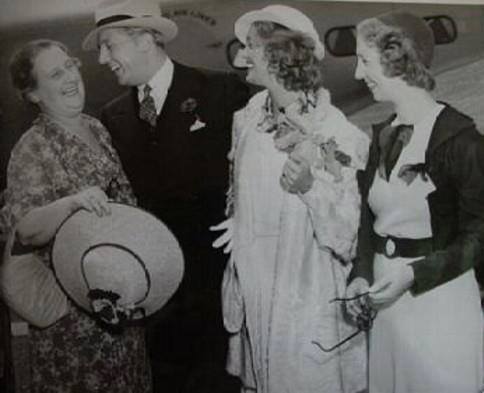
In the photo above we see a candid shot of Anna MacDonald, Gene Raymond, Jeanette and her sister Blossom.
Two days before her marriage to actor Gene Raymond, Jeanette MacDonald wrote her ex-love (or ex-husband) Bob Ritchie, as quoted in the book Sweethearts:
I have had fears and qualms but lately none at all and as the date approaches I feel more relaxed and certain I am not making a mistake – I am going to try and make this go as I have always with everything else.
The original of this amazing letter is in the Ritchie family collection and for some reason Bob Ritchie kept the letter all his life. Maybe he hoped/sensed the marriage wouldn’t work and he could get back together with Jeanette on a personal level – as he did remain her manager after her marriage.
The following day, Jeanette penned a letter to Nelson Eddy’s mother, Isabel, in which she wrote (again quoted from Sweethearts):
I must be a happy bride tomorrow – I must – I must go to Gene not with my heart’s love, for that is impossible, but with purity of spirit – and a calm mind – a prayer in my heart.
Whoa! It’s not uncommon for brides to have have last-minute jitters. But let’s take a step back and realize that we’re talking about an A-list movie star about to marry someone she’s not really sure she loves! But for whatever reasons, some of them discussed here, she went ahead and took the plunge.
Look again at the photo above, which shows us Jeanette’s mother, Anna MacDonald (who had been widowed for over a decade), all flirty and giggly with Gene Raymond. What we see here is Anna at her happiest. Don’t know about you but I’ve never seen a photo of Anna MacDonald looking happier! In fact, I’ve never seen her laughing before!
Nelson Eddy, on the other hand, called Anna MacDonald “a witch” and had no use for her. No social graces with her, wouldn’t even pretend to like her or to try and win her approval.
And come to think of it, is there even a photo of her with Nelson – a suitor that she despised? Feel free to email it to me if you have one.
Gene Raymond was a smart man. He knew to court Jeanette he had to also court her mother. His own mother was a PR disaster (publicly anti-Semitic) and a personal disaster (didn’t much like Jeanette for some reason and was violently against him marrying her). To look at this photo and see Anna all giggly and girlish with Gene, we perhaps have a better understanding why Jeanette would want peace and mother’s approval in her life and would marry the man who won her mother’s approval.
The fact that Gene’s mother was so against their marrying may have also pushed Jeanette and Gene closer in those final weeks before their wedding….just to prove the woman wrong.
So as a result, we have the photo below of Nelson and his mother Isabel arriving at Jeanette’s wedding. He wears the same miserable, resigned expression that he had several days earlier arriving at Jean Harlow’s funeral. You notice that Isabel, while beautifully gowned, doesn’t look too thrilled either.
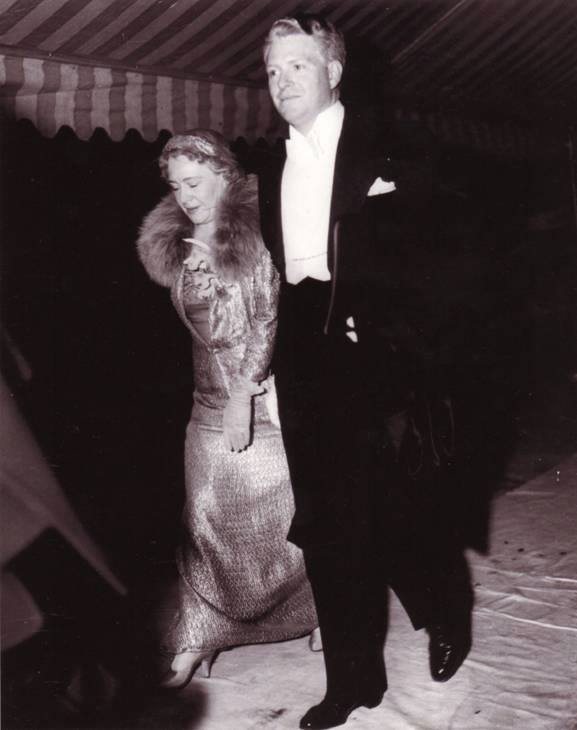
In Jeanette’s Autobiography, she mentions a few times her evident surprise that she and Gene would not have children. She writes:
In those days when we shaped our lives together, I had to try not to make an issue of anything, not to argue….I had to learn early that tears would get me nowhere. There was also one subject I didn’t allow myself to pursue, except in my private daydreaming. The Mac-Raymonds had no children.
This is first mentioned when they returned from their Hawaii honeymoon. And then later in the book, Jeanette is talking about the post-war years and she writes an entire paragraph about this subject but then crosses it out with a big “x”. And then she crosses out with a squiggly line the next paragraph: “I might have had children. Dear God, why didn’t I? We could have given them so much.” See the photo below:
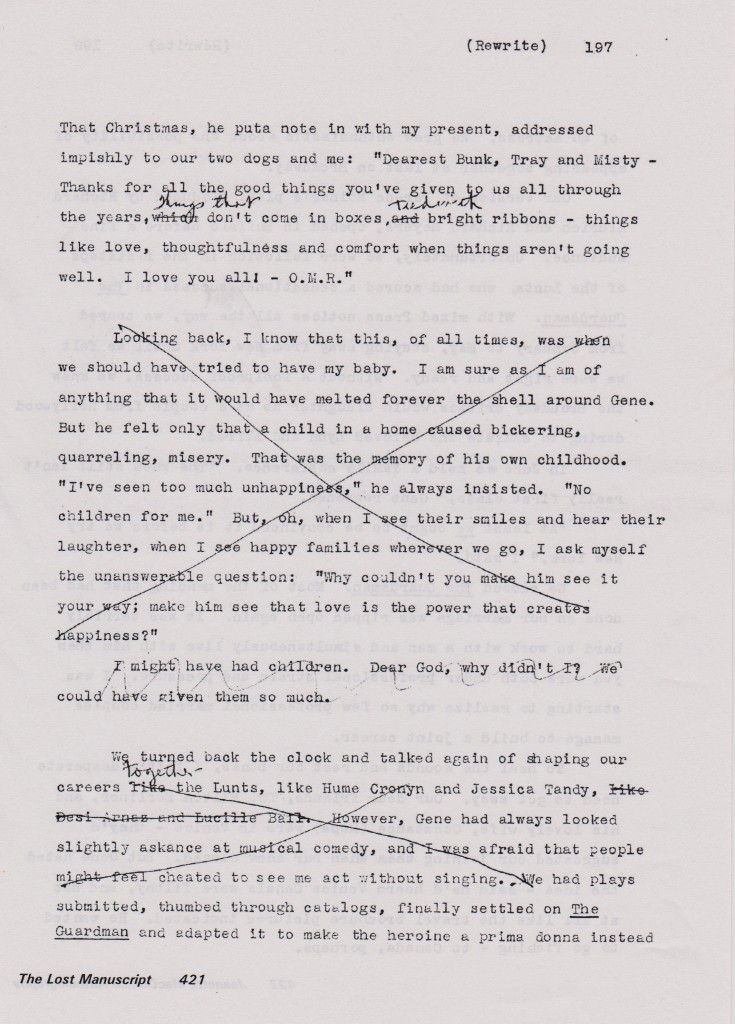
Now, she’s not being fully honest here. As she does very cagily in this book, she blurs who she’s referring to as her “husband.” She is definitely talking about a real goal in her life – having a baby. “I might have had children,” indicates that she was physically capable of getting pregnant. Only – Gene did not want children, she explains, and she couldn’t convince him otherwise. She misleads by suggesting that this is why she had no children.
You should know that at one time, Jeanette considered ‘fessing up to at least one actual pregnancy in her autobiography. Yes folks, she was going to admit it. That section was deleted and watered down to simply her “desire” to have a child but not the realization of it. Was this considered too controversial to be published? Did Jeanette back down because it was too painful for her? Or perhaps concerned about the pain it might cause Nelson because she would have to lie and state that the baby was Gene’s?
We don’t know the answers.
The fact is that we have documentation from contemporary letters – and visual evidence from photos – of several pregnancies. So if Gene was not the father – and she’s stating very firmly that he wasn’t – then who the heck was? No answers in her Autobiography (in its “finished” form) but Jeanette was visibly pregnant during the filming of Sweethearts, no denying it. There are other pregnancies (from mentions in contemporary letters and discussed in my book Sweethearts) over the next few years, particularly when Gene is overseas or in Yuma during WWII. This is why the contemporary letters, particularly from Isabel, are so vital. It was not until I first saw those letters in 1990 that I learned there was most likely another pregnancy gone wrong later in 1938, months after the one that hospitalized Jeanette in July. She returned to the hospital during the fall and then again in November. At that time she looks paunchy around the middle while filming Broadway Serenade, for example. As discussed in Sweethearts, there is mention that Nelson was upset that he was responsible for her “bad ovary.” Why suddenly did something go wrong with her ovary? There’s no doubt that while Jeanette was filming Broadway Serenade, she literally wanders through it giving a lackluster performance. Her eyes are filled with tears in certain scenes that don’t call for it, such as this one below. Her eyes well up in several scenes; I personally find it difficult to watch this film with her struggling to be the professional actress that she needs to be.
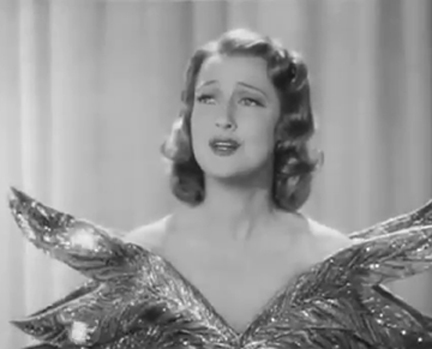
My assumption based on the little information we have is that she went to the hospital and had a medically necessitated termination of this pregnancy. And that Nelson somehow blamed himself for what happened.
Then we have the mid 1940s in which the letters tell us of Jeanette’s frantic attempt to have a child before she is too old to do so. During this time, there are several gossip blurbs alluding to Nelson’s futile efforts to get a divorce from Ann, offering her basically $2 million and anything else she wants – as long as she doesn’t drag Jeanette’s name through the mud. But Ann won’t agree. In the meantime, Jeanette attempts to force matters by having at least two well-documented pregnancies during this time. In both of these cases, she miscarries.
Gene Raymond returns from the war to find his wife still trying desperately to have the love child she had promised Nelson but had failed to deliver. We can only imagine how Gene felt – any man would feel – coming home to this situation. No matter the circumstances of his marriage to Jeanette, Gene also had his pride and a limit to his tolerance. While Jeanette is not honest about WHY Gene wanted out of the marriage, she does admit that Gene “embarked on a semi-bachelor existence” after the war (see below). And really wanted out of this marriage.
Because Gene Raymond did not want children. And now he would be asked to raise another man’s child as his own because Nelson could not get a divorce. Even those who are not sympathetic to Gene have to wonder how he was expected to swallow this strange scenario.
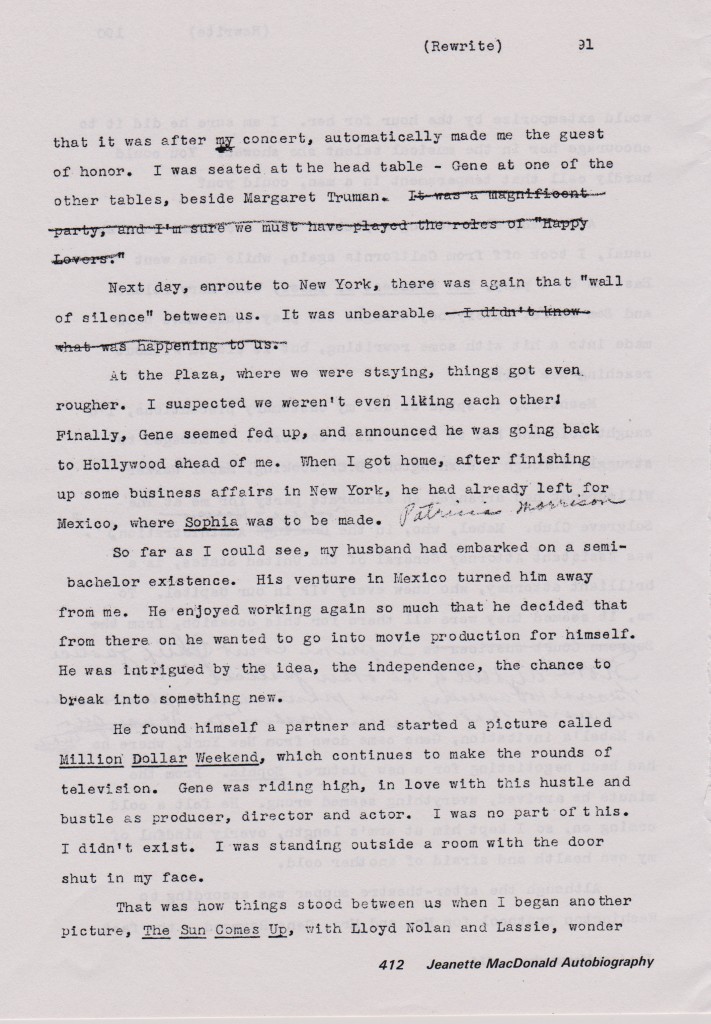
The fact is, in Hollywood this scenario wasn’t so unusual. Don’t forget the whole charade Loretta Young went through with her daughter Judy, courtesy of Clark Gable. She put the baby into an orphanage and then “adopted” her and cooked up some phony story about adopting two children but then ending up with one, etc. So don’t think that Jeanette and Nelson wouldn’t have carried through with whatever shenanigans had to be done. Although Nelson kept insisting that Jeanette NOT raise the child with Gene’s name yet he didn’t want her divorced or to be a single mother living on her own – or also to be prey for other men who might have wanted her. What a dilemma.
There is no doubt that Gene finally decided to stick with the marriage after the war. Perhaps because – as Isabel learned – “Jeanette recently settled a lot of money on Gene so he doesn’t have to work ever again if he doesn’t want to.” But in sticking with Jeanette, Gene continued to be “the forgotten man.” Such as in the 1950 photo below where it’s NELSON all over Jeanette, his arm around her waist. Gene is pushed away to the middle…and the Melchiors are looking at Nelson and Jeanette – Gene could be invisible for all they care.
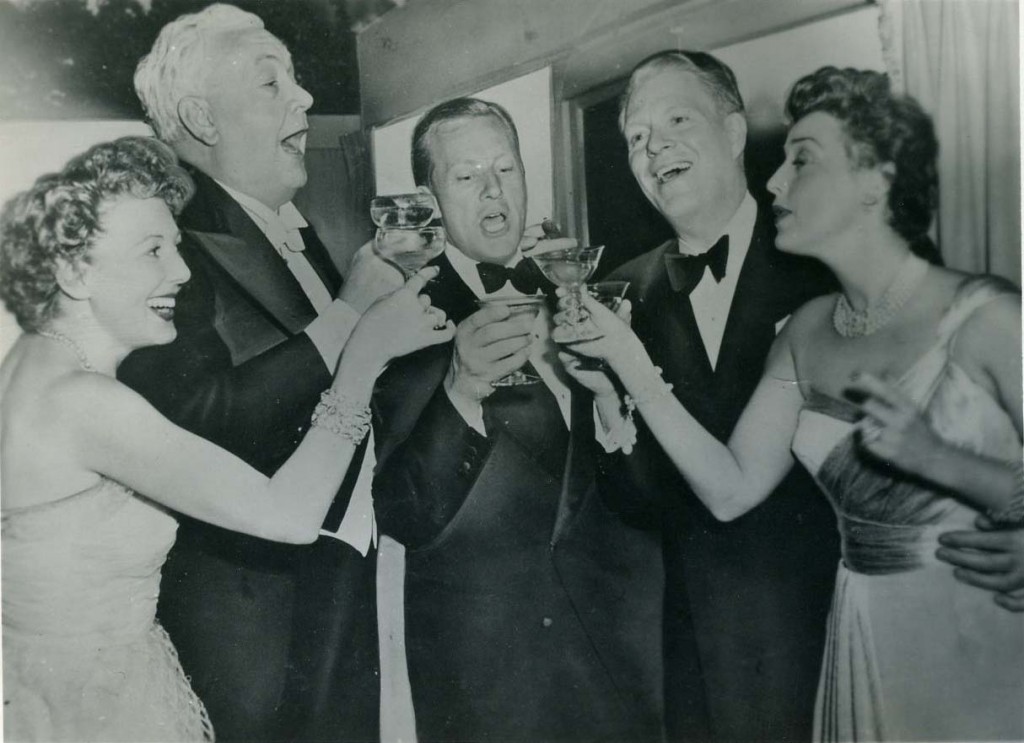
Gene Raymond had some idea that he would return from the war and that he and Jeanette would create a professional future for themselves working together. He wrote her: “When this war business is over, you and I are going to be mighty important people in the theatrical world! It may be in Hollywood or it may be in New York, but, whichever, it’s going to be you and me together as an important pair! I’ve made up my mind to do that!”
Yeah, right. Instead, Jeanette was busy trying to have a baby and/or return to MGM with Nelson. It wasn’t until the end of the decade, when Jeanette had a “final” breakup with Nelson (she had waited ten years for him to leave Ann) that she had a breakdown, tossed in the towel, tried to create a new life for herself and moved forward with Gene to go to Broadway with The Guardsman. And that show never made it, despite many re-tweaks and adding a mini-concert sung by Jeanette during the show.
There was no charisma for audiences between Jeanette and Gene. They should have learned from their 1941 movie Smilin’ Through which also didn’t catch the fancy of audiences. They could go through the motions but audiences weren’t buying it.
In her autobiography, Jeanette discusses their marital problems in the post-war years…all the way into the 1950s – resuming (not coincidentally) after Nelson comes back on the scene in late 1952.
This isn’t to say that all was rosy with Nelson during the ’50s, it definitely was not. But Jeanette and Gene came to some comfortable (for them) lifestyle in what Jeanette termed “a marriage of separations.” There were admittedly times when Jeanette leaned on Gene for emotional support. After all, with Nelson over the years, he was quick to run to others for comfort and sex when he and Jeanette had a falling out.
But Jeanette never did. I never heard a single rumor or knowledgeable statement that Jeanette “retaliated” with other men. Only Gene she had to fall back on when lonely or needed or she was disgusted with Nelson.
Did Gene “do it” for her? The answer has to be NO based on the fact that she tried very hard – starting in 1957 – to convinced Ann Eddy to give Nelson his divorce without making a scandal. Whatever Jeanette said or did, she got Ann to finally agree…and it was all to go down in 1958.
That didn’t happen, as we know. But what it tells you is that all the lovey-dovey letters between Gene and Jeanette looked so very nice on paper…but meant nothing if Jeanette was ready to drop it all and run off with Nelson even at that late date.
It is another “deja vu” instance of Jeanette writing lovingly to Irving Stone and making him feel special and loved when she’s already sleeping with Bob Ritchie and supposedly crazy in love with him!
Over the years, this whole arrangement wore Gene down, no doubt about it. There’s not any other way to explain his complete disinterest in Jeanette and just barely going through the motions in her last couple of years – plus his total neglect and active abuse of her. And this is documented on a DAY TO DAY BASIS by Jeanette herself, in her 1963 desk diary. That heartbreaking testimony will be the subject of the next article about the Gene Raymond connection.
